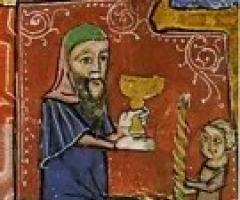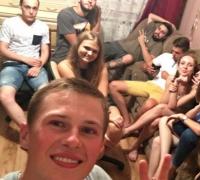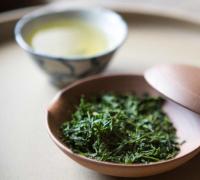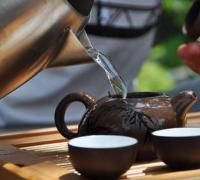Most of all, love for my native land. “Love for my native land tormented me, tormented me and burned me
Dedicated to P. Chagin
I'm talking about my talent
I know a lot.
Poems are not very difficult things.
But most of all
Love to native land
I was tormented
Tormented and burned.
Write a poem
Perhaps anyone can -
About a girl, about the stars, about the moon...
But I have a different feeling
The heart is gnawing
Other thoughts
They crush my skull.
I want to be a singer
And a citizen
So that everyone
Like pride and example,
Was real
And not a stepson -
In the great states of the USSR.
I ran away from Moscow for a long time:
I get along with the police
Not up to speed
For every beer scandal I have
They held me
In Tigulevka.
Thank you for the friendship of these citizens,
But very tough
Sleep there on the bench
And in a drunken voice
Read some verse
About cell fate
Poor canary.
I'm not your canary!
I'm a poet!
And no match for some Demyan.
Even though sometimes I'm drunk,
But in my eyes
Wonderful light of insight.
I see everything
And I understand clearly
What a new era -
Not a pound of raisins for you,
What is the name Lenin
It rustles like the wind along the edge,
Letting my thoughts go,
Like mill wings.
Turn around, darlings!
Good is promised for you.
I'm your nephew
You are all my uncles.
Come on, Sergey,
Let's sit quietly for Marx,
Let's smell wisdom
Boring lines.
Days run like streams
Into the foggy river.
Cities flash by
Like letters on paper.
Recently I was in Moscow,
And now here in Baku.
Into the element of fishing
Chagin dedicates us.
“Look,” he says, “
Aren't churches better?
These are the towers
Black oil gushers.
We've had enough of mystical mists,
Sing, poet,
Which is stronger and more alive."
Oil on water
Like a Persian blanket
And evening across the sky
The star sack scattered.
But I'm ready to swear
With a pure heart
What are the lanterns
More beautiful than the stars in Baku.
I'm full of thoughts about industrial power,
I hear the voice of human strength.
We've had enough
All heavenly bodies -
To us on earth
It's easier to arrange this.
And yourself
Stroking the neck,
I speak:
"Our time has come,
Come on, Sergey,
Let's sit quietly for Marx,
To solve
The wisdom of boring lines."
Other articles in the literary diary:
- 27.10.2012. ***
- 25.10.2012. ***
- 23.10.2012. ***
- 10/16/2012. Xnj, s nj pyfxbkj
- 15.10.2012. ***
- 10/11/2012. From my own life observations.
- 02.10.2012. Shota Rustaveli. Knight in tiger skin.
- 01.10.2012. Sergey Yesenin.
On October 14-15, the All-Russian scientific and practical conference “New technologies for introducing regional historical materials into the practice of teaching school and university courses in the history of Russia.”
It is expected that the conference will involve not only scientists, history teachers of universities and schools in Ryazan, but also representatives of the scientific community of a number of Russian cities and even guests from abroad, in particular from Germany. After all, it was in this country that at one time historians were faced with a task similar to ours - how to change the attitude of society towards the past of their own country, without compromising patriotic feelings.
The relevance of the stated topic of the conference is beyond doubt, if only because Lately V Russian state and society, there is obvious concern about the level of teaching of national history both in schools and in higher education educational institutions. The younger generation’s ignorance of Russia’s past and a kind of historical nihilism have reached their apogee, for which there is more than enough evidence.
It must be said that, along with the problems of interpreting one’s own history that have emerged in recent decades, a lot of good things are still happening. First of all, this concerns the sustained interest in local, personal, even family history, which has emerged recently. It is in the last 15-20 years that the local history component of national history has been experiencing a kind of renaissance: archival funds have become more accessible for local history work, and local museums, including school ones, more and more books and research materials are being published on the history of their native land. The situation with the study of local history is very reminiscent of the beginning
last century. Then everything started well with the intensification of local history work, but quickly ended with the prejudice of the Soviet authorities towards local historians. The Soviet country needed a new history, one for all. Local variations and accents were considered unnecessary and even harmful.
Now everything is back to normal. Historians—professionals and local history enthusiasts—gather bit by bit evidence of the past, for the most part lost. Local museums and private collections are filled with them. A Ryazan textbook on regional studies is being prepared; the local history component is increasingly used in school lessons by history teachers, who in this way save their students from unconsciousness.
The university, which trains professional researchers and history teachers, has also accumulated many years of experience scientific research past of the land of Ryazan, many publications and dissertation studies have been prepared based on materials
Ryazan archives and libraries. Libraries, by the way, have become unique centers for studying local history and accumulating knowledge about it. It is no coincidence that the Ryazan Regional Library named after Gorky, a repository and active promoter of a huge amount of knowledge about the past of the region, will also participate in the upcoming conference.
How to combine all the accumulated potential into one powerful creative flow directed towards a specific goal? Teach history as a subject and at the same time form one of the elements of social self-awareness of society, pass on positive values from generation to generation, and cultivate a positive attitude towards one’s country and oneself.
The conference, initiated by the Department of Russian History of the Russian State University under the leadership of Professor A.F. Agarev, will begin its work on October 14 at 10 a.m. in the conference hall of the Ryazan state university. We will tell you more about the results of her work.
Irina Sizova Ryazan Gazette No. 192 (10.10.2008)
April 1 marks the 95th anniversary of the birth of the talented painter, Honored Artist of the Yakut Autonomous Soviet Socialist Republic, member of the Union of Artists of the USSR Lev Gabyshev.
Lev Mikhailovich was born on April 1, 1923 in Yakutsk in the family of the famous Olekma philanthropist, “Yakut Tretyakov” in the region visual arts, the doctors economic sciences, professor Mikhail Fedorovich Gabyshev. He studied at the Moscow Art School in memory of 1905, the painting department of the Moscow State Art Institute named after V.I. Surikov.
The creative biography of L.M. Gabyshev began during the Great Patriotic War. His satirical posters, drawings, cartoons, propaganda posters on the pages of the newspapers “Kyym” and “Socialist Yakutia” were a weapon of the young artist’s struggle against fascism. In 1944, the first personal exhibition of Lev Gabyshev’s works took place, where his fellow countrymen recognized him as the author of landscape painting.

Gradually, his painting studies began to combine with art history interests. From 1952 to 1975 becomes director of the Yakut Republican Museum of Fine Arts, is an active organizer of the artistic life of the republic. With his assistance, in 1962, a gratuitous gift was received into the museum’s collection - the collection of his father, Professor M.F. Gabyshev. This collection, which included more than 250 works of Western European art of the 16th-19th centuries, served as the basis for the opening of the Museum of Western European Art in the capital of the republic.

Lev Mikhailovich was a promoter of fine arts, speaking in print, on radio and television. He owns a study about little-known Yakut bone carvers of the 19th and early 20th centuries; Together with employees of the central art restoration workshops, he established the authorship of several works, thanks to which the emergence of painting in Yakutia was pushed back a whole century.
Today the National Art Museum is an invaluable national treasury of the Republic of Sakha (Yakutia), where there are masterpieces of world and domestic art. This is the great merit of Lev Gabyshev, a wonderful artist and devotee of museum work.

Among the famous works of Lev Mikhailovich you could see “Lena Distances”, “Old Village on the Bank of the Lena”, “Autumn in Yunkur” and others. The collections of the Olekminsky Museum carefully preserve the paintings “Taiga Beauty”, “Yakut Horseman”, “Portrait of a Man”, in which he conveyed his love for his native land and the beauty of the Yakut nature.

Soon, the works of Lev Mikhailovich and the works of other Yakut artists will take their rightful place and will be presented to visitors in the new building of the Olekminsky Museum of the History of Agriculture.
Yulia ERKO,
curator of the Olekminsky Museum of the History of Agriculture.
In the photo: L.M. Gabyshev; in the family; artist's works: portrait of a man; Taiga beauty: Yakut horseman.
Composition
The beautiful, bright, sonorous and multi-colored lyrics of Sergei Yesenin are filled with high patriotism. Whatever the poet writes about, it’s all about Russia. She appears to the author either as a tender birch girl, or as a blue girl who fell into the river, sometimes as meek and serene, sometimes as restless and proud, but always infinitely loved.
Swamps and swamps,
Blue board of heaven.
Coniferous gilding
Weighs the forest.
Yesenin is akin to the vast expanses of Russia; he thinks on a cosmic scale, including earth and sky in his poems. It takes your breath away from the images with which the poet thinks, from the epithets with which he bestows on everything that exists. The author's favorite technique is personification. He refers to trees and grasses, rivers and lakes, steppes and fields as close friends, including them in his confidential conversation. Hence the poet’s special kinship with the world around him, complete fusion with nature, which the author constantly strives for. If this harmony does not exist, the poet experiences melancholy, sadness, and discomfort. His friend nature reacts sensitively to the author’s state, or vice versa. Yesenin perfectly sees the mood of the world around him and knows how to sensitively convey it in colors.
Black, then smelly howl! How can I not caress you, not love you? I’ll go out onto the lake into the blue road, Evening grace clings to my heart. The huts stand like gray ropes, the squelching reeds are silently lulled. The red fire bled the tagans, The white eyelids of the moon are in the brushwood.
Contrasting colors create internal tension in the narrative, psychologism is present in every couplet. The poet surprisingly accurately and dramatically conveys the melancholy that sounds in Russian folk songs, its lyrical beauty.
Green and blue are the traditional colors of Russia in Yesenin’s poetic world. The author often combines them, giving them as shades of each other. Raised in an Orthodox family since childhood, Yesenin could not help but know that blue is the patronage of the Virgin Mary, the intercessor of Rus', and the color of innocence and purity. This is how he sees his homeland, sublime and beautiful. Behind the dark strand of copse trees, In the unshakable blue, The curly moon lamb Walks in the blue grass.
Later, gray will appear, instead of golden lemon yellow. This is how the author imagines a soulless city, with buildings of skeletons, streets of stone caves. There is no harmony in the surrounding world, and dissonance can be heard in the poetics: the horns squeal, the cow roars in the shadows...
The poet sees something completely different in his native lands; he feels joy traveling around his father's land.
The dug-up road sleeps. Today she dreamed that there was very, very little time left to wait for the gray winter. Oh, and I myself, in the ringing thicket, saw yesterday in the fog: The red moon as a foal Harnessed to our sleigh.
Yesenin's poetic spirit is directly related to the poet's mood and the general state of the world around him. He associates purple-red and golden-orange tones with maturity and wisdom.
The golden grove dissuaded me with a cheerful birch tongue, and the cranes, flying sadly, no longer regret anyone. The rowan brushes will not stain, The yellowness will not make the grass disappear, Just as a tree silently drops its leaves, So I drop sad words.
Yesenin’s surprisingly tender, melodious and colorful poetry leaves an indelible mark on the reader’s soul, teaching him to be a devoted, selfless and faithful son of the great and long-suffering country of Russia.












